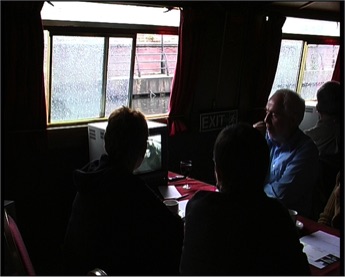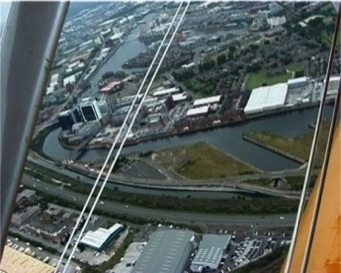v
v
v
v

Boat Trip: Nothing But Flowers
2003/4

The project explored and represented the margins of the Manchester Ship Canal. The area is rich in layered history and contemporary identities. While undergoing regeneration it retains evidence of its former lives and accommodates diverse communities of people who live, work and play there.
The bank and immediate environs were explored on foot, by boat and by flying over. Divers were commissioned to look below the water. Working with local people and performing themselves the artists developed narratives around selected sites. People included developers, a former stevedore, a fishery supervisor, a factory worker, CABE and a cafe owner. Interventions included planting lavender on derelict dockland which was once a garden and having breakfast in a transport cafe. Other material included a clip from A Taste of Honey which was shot on the Trafford Road Bridge and the Talking Heads song (Nothing but) Flowers.
Leisure boat trips are a common way for people to safely explore waterways accompanied by a selective and partially fabricated commentary, so passengers were taken on trips from The Lowry to the Lowry Hotel in the city and back. They could observe the real bank passing outside alongside a video relay of the same view. This was interrupted by incidents which had been recorded on the bank. A live commentary wove the various strands and versions together.
Commissioned by The Lowry supported by Arts Council and Esmee Fairburn Foundation. The publication was additionally funded by Manchester Metropolitan University and University of Central Lancashire.
"A snoop into the private life of waterside Manchester which is beautiful, mysterious and murderously tragic. A bit of the past, a lot of the future and a splattering of confusion about the present".
Billy Partridge, Boat Trip Passenger
(Nothing but) Flowers by Talking Heads licensed courtesy EMI Records
From a review of Arcadia id Est Exhibition by Elisabeth Long in Afterimage 34.6
"In Boat Trip: Nothing But Flowers Tea uses the specific and subjective as a launching point to explore the broader social and environmental implications of the development along the Manchester Ship Canal in England. Ostensibly a document of a boat trip along the canal, the book reaches beyond the simplicity of observation and interweaves a variety of visual perspectives - distant aerial views, detailed underwater close-ups, onshore explorations, historical associations and interviews with locals. An accompanying DVD elegantly juxtaposes personal experience with seemingly more objective, journalistic information. The background is a real-time film of the banks of the canal as seen from the boat, the scenery in a constant flow going in and out of darkness as the boat passes under bridges. But overlaid on this stream of experience are images revealing details of the onshore environment travelling even into the interiors of buildings. A voiceover describes the history of the area, the implications of the surrounding development and the commentary by locals. While the book and the film explore the realms of the personal versus the social, the built environment versus the natural environment and juxtaposes the accessible exterior of a place with the hidden interior significance of it, the authors wrestle with the fictive nature of any such endeavour, recognising the personal biases implicit in every choice made about what to point out on such a tour."
The publication included an introduction by Jim Aulich and commissioned writings by Phil Griffin and Melanie Philips, stories contributed by passengers, images and a DVD documenting the trips. It toured internationally as part of Arcadia id Est curated by Sarah Bodman of UWE. ISBN 0 9536370 1 8